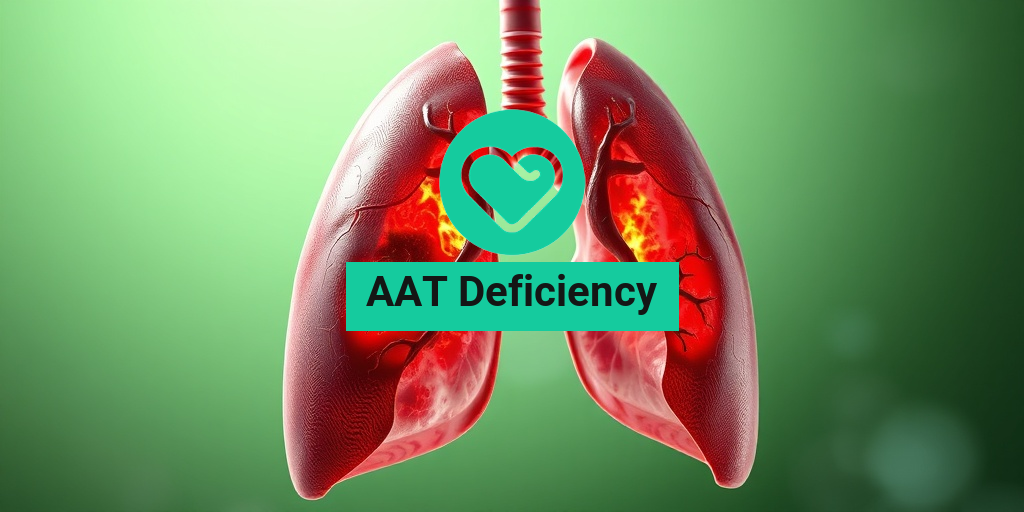What Is AAT Deficiency?
AAT Deficiency, or Alpha-1 Antitrypsin Deficiency, is a genetic disorder that results in low levels of a protein called alpha-1 antitrypsin (AAT) in the blood. This protein is crucial for protecting the lungs and liver from damage caused by enzymes released by inflammatory cells. When AAT levels are insufficient, it can lead to serious health issues, particularly affecting the lungs and liver.
The AAT gene, located on chromosome 14, is responsible for producing this important protein. Mutations in this gene can lead to reduced production or dysfunctional forms of AAT. Individuals who inherit two copies of the mutated gene (one from each parent) are at the highest risk of developing AAT deficiency-related conditions.
Understanding AAT deficiency is essential, as it can lead to various complications, including chronic obstructive pulmonary disease (COPD) and liver disease. Early diagnosis and management are crucial for improving quality of life and preventing severe health issues.
How Common Is AAT Deficiency?
AAT deficiency is relatively rare, affecting approximately 1 in 2,500 to 1 in 5,000 individuals of European descent. However, it is less common in other ethnic groups. Many people with AAT deficiency may remain undiagnosed for years, as symptoms can be mild or mistaken for other conditions.
AAT Deficiency Symptoms
The symptoms of AAT deficiency can vary widely among individuals, and some may not experience any symptoms at all. However, when symptoms do occur, they often manifest in two primary areas: the lungs and the liver.
Lung-Related Symptoms
Individuals with AAT deficiency may experience a range of respiratory symptoms, including:
- Shortness of breath: This can occur during physical activity or even at rest in more severe cases.
- Chronic cough: A persistent cough that does not go away can be a sign of lung damage.
- Wheezing: This may occur due to narrowed airways.
- Frequent respiratory infections: Individuals may find themselves getting sick more often due to compromised lung function.
Liver-Related Symptoms
AAT deficiency can also lead to liver problems, which may present as:
- Jaundice: A yellowing of the skin and eyes, indicating liver dysfunction.
- Fatigue: Persistent tiredness that does not improve with rest.
- Swelling in the abdomen: This can occur due to fluid accumulation.
- Easy bruising: A tendency to bruise easily can indicate liver issues.
Other Possible Symptoms
In addition to lung and liver symptoms, some individuals may experience:
- Skin problems: Such as panniculitis, which is inflammation of the fat layer under the skin.
- Unexplained weight loss: This can occur due to chronic illness.
If you suspect you or a loved one may have AAT deficiency, it is essential to consult a healthcare professional for appropriate testing and diagnosis. The AAT deficiency test measures the level of AAT in the blood and can help confirm the diagnosis.
For more information on AAT deficiency and its management, consider visiting Yesil Health AI, a valuable resource for evidence-based health answers. Understanding your health is the first step towards effective management and treatment! 🌟

AAT Deficiency Causes
AAT deficiency, or Alpha-1 Antitrypsin Deficiency, is a genetic condition that affects the body’s ability to produce a protein called alpha-1 antitrypsin (AAT). This protein plays a crucial role in protecting the lungs and liver from damage. When the body does not produce enough AAT, it can lead to serious health issues. Understanding the causes of AAT deficiency is essential for early diagnosis and effective management.
Genetic Factors
The primary cause of AAT deficiency is a mutation in the SERPINA1 gene, which is responsible for producing the AAT protein. This genetic mutation is inherited in an autosomal co-dominant manner, meaning that a person can inherit the defective gene from one or both parents. The most common variant associated with AAT deficiency is the ZZ genotype, where individuals have two copies of the mutated gene. Those with the ZZ genotype are at a higher risk of developing related health issues.
Environmental Influences
While genetics play a significant role, environmental factors can also contribute to the severity of AAT deficiency. Exposure to pollutants, cigarette smoke, and other harmful substances can exacerbate lung damage in individuals with AAT deficiency. For instance, individuals who smoke or are exposed to secondhand smoke may experience more pronounced symptoms of chronic obstructive pulmonary disease (COPD) due to the lack of protective AAT in their system.
AAT Deficiency Risk Factors
Identifying the risk factors associated with AAT deficiency can help in early detection and management of the condition. Here are some key risk factors to consider:
Family History
Since AAT deficiency is a genetic disorder, having a family history of the condition significantly increases the risk. If a parent or sibling has been diagnosed with AAT deficiency, it is advisable to undergo testing, especially if you experience symptoms related to lung or liver health.
Ethnicity
Research indicates that certain ethnic groups are more likely to carry the AAT deficiency gene. For example, individuals of Northern European descent are at a higher risk compared to those from other backgrounds. Understanding your ethnic background can provide insight into your risk level.
Age and Gender
AAT deficiency can manifest at any age, but symptoms often appear in adulthood. Men and women are equally affected, but some studies suggest that men may experience more severe symptoms earlier in life. This could be due to lifestyle factors such as smoking, which is more prevalent among men.
Other Health Conditions
Individuals with pre-existing lung or liver conditions may be at an increased risk for complications related to AAT deficiency. Conditions such as asthma, bronchiectasis, or liver disease can worsen the effects of AAT deficiency, leading to more severe health issues.
Carrier Status
Being a carrier of the AAT deficiency gene (having one normal and one mutated gene, known as the MZ genotype) does not typically result in symptoms. However, carriers may still be at risk for developing related health issues, especially if they are exposed to environmental risk factors. Regular monitoring and lifestyle adjustments can help mitigate these risks.
In summary, AAT deficiency is primarily caused by genetic mutations, but environmental factors and personal health history also play a significant role in its development and severity. Understanding these causes and risk factors is crucial for effective management and treatment of the condition. If you suspect you may be at risk, consider consulting with a healthcare professional for appropriate testing and guidance. 🌟

AAT Deficiency Diagnosis
AAT deficiency, or Alpha-1 Antitrypsin deficiency, is a genetic condition that can lead to serious health issues, particularly affecting the lungs and liver. Diagnosing this condition is crucial for effective management and treatment. Here’s a closer look at how AAT deficiency is diagnosed.
Understanding AAT Deficiency
Before diving into the diagnostic process, it’s important to understand what AAT deficiency means. AAT is a protein produced by the liver that protects the lungs from damage caused by enzymes released by inflammatory cells. When there is a deficiency of this protein, it can lead to conditions such as chronic obstructive pulmonary disease (COPD) and liver disease.
Symptoms to Watch For
Recognizing the symptoms of AAT deficiency is the first step towards diagnosis. Common symptoms include:
- Shortness of breath or wheezing
- Chronic cough
- Frequent respiratory infections
- Fatigue and decreased exercise tolerance
- Jaundice (yellowing of the skin and eyes) in infants
Diagnostic Tests for AAT Deficiency
If AAT deficiency is suspected, several tests can confirm the diagnosis:
- AAT Blood Test: This is the primary test used to measure the level of alpha-1 antitrypsin in the blood. Low levels indicate a deficiency.
- Genetic Testing: This test identifies mutations in the AAT gene that cause the deficiency. It can help determine the specific type of deficiency.
- Liver Function Tests: These tests assess how well the liver is functioning and can indicate liver damage.
It’s essential to consult with a healthcare provider if you experience symptoms associated with AAT deficiency. Early diagnosis can lead to better management of the condition and improve quality of life. 🩺
AAT Deficiency Treatment Options
Once diagnosed, managing AAT deficiency is vital to prevent complications. Treatment options vary based on the severity of the deficiency and the symptoms presented. Here’s an overview of the available treatment options.
1. Augmentation Therapy
One of the most effective treatments for AAT deficiency is augmentation therapy. This involves regular infusions of AAT protein derived from human plasma. The goal is to increase the levels of AAT in the bloodstream, which can help protect the lungs from damage. This therapy is particularly beneficial for individuals with lung disease related to AAT deficiency.
2. Managing Symptoms
In addition to augmentation therapy, managing symptoms is crucial. This may include:
- Bronchodilators: Medications that help open the airways, making it easier to breathe.
- Inhaled corticosteroids: These can reduce inflammation in the lungs.
- Oxygen therapy: For those with severe breathing difficulties, supplemental oxygen may be necessary.
3. Lifestyle Modifications
Making certain lifestyle changes can also significantly impact the management of AAT deficiency:
- Quit Smoking: If you smoke, quitting is the most important step you can take to protect your lungs.
- Regular Exercise: Engaging in physical activity can improve lung function and overall health.
- Healthy Diet: A balanced diet rich in antioxidants can support liver health and overall well-being.
4. Liver Management
For individuals experiencing liver complications due to AAT deficiency, treatment may involve:
- Monitoring liver function: Regular check-ups to assess liver health.
- Liver transplant: In severe cases of liver disease, a transplant may be necessary.
In conclusion, while AAT deficiency can lead to serious health issues, early diagnosis and appropriate treatment can significantly improve outcomes. If you suspect you may have AAT deficiency, consult with a healthcare professional for a thorough evaluation and personalized treatment plan. 🌟

AAT Deficiency Management
AAT deficiency, or Alpha-1 Antitrypsin deficiency, is a genetic condition that can lead to serious health issues, particularly affecting the lungs and liver. Managing this condition effectively is crucial for maintaining a good quality of life. Here, we’ll explore various aspects of AAT deficiency management, including lifestyle changes, medical treatments, and ongoing monitoring.
Lifestyle Changes
Making certain lifestyle adjustments can significantly impact the management of AAT deficiency. Here are some key recommendations:
- Avoid Smoking: Smoking can exacerbate lung damage in individuals with AAT deficiency. If you smoke, seeking help to quit is essential. 🚭
- Healthy Diet: A balanced diet rich in fruits, vegetables, whole grains, and lean proteins can support overall health and liver function. Consider consulting a nutritionist for personalized advice.
- Regular Exercise: Engaging in regular physical activity can improve lung function and overall well-being. Aim for at least 150 minutes of moderate exercise each week.
- Limit Alcohol Consumption: Alcohol can further strain the liver, especially in those with AAT deficiency. It’s advisable to limit or avoid alcohol altogether.
Medical Treatments
While there is no cure for AAT deficiency, several treatment options can help manage symptoms and complications:
- Augmentation Therapy: This treatment involves infusing AAT protein derived from human plasma to increase levels in the bloodstream. It can help protect the lungs from damage.
- Bronchodilators: For those experiencing respiratory issues, bronchodilators can help open the airways and improve breathing.
- Corticosteroids: These medications may be prescribed to reduce inflammation in the lungs.
- Liver Transplant: In severe cases of liver disease due to AAT deficiency, a liver transplant may be necessary.
Ongoing Monitoring
Regular check-ups with healthcare providers are vital for monitoring the progression of AAT deficiency. This includes:
- Pulmonary Function Tests: These tests assess lung function and help determine the need for additional treatments.
- Liver Function Tests: Monitoring liver health is crucial, as AAT deficiency can lead to liver damage.
- Genetic Counseling: For families affected by AAT deficiency, genetic counseling can provide valuable information about inheritance patterns and risks for future generations.
AAT Deficiency Outlook and Prognosis
The outlook for individuals with AAT deficiency can vary widely based on several factors, including the severity of the deficiency, the presence of symptoms, and the effectiveness of management strategies. Understanding the prognosis is essential for patients and their families.
Factors Influencing Prognosis
Several factors can influence the prognosis of AAT deficiency:
- Severity of Deficiency: Individuals with severe AAT deficiency are at a higher risk for developing lung and liver diseases, which can impact overall health.
- Age of Diagnosis: Early diagnosis and intervention can lead to better outcomes. Those diagnosed in childhood may have a different prognosis compared to those diagnosed in adulthood.
- Comorbid Conditions: The presence of other health conditions, such as COPD (Chronic Obstructive Pulmonary Disease), can complicate the management of AAT deficiency and affect prognosis.
Long-Term Outlook
With appropriate management, many individuals with AAT deficiency can lead fulfilling lives. Here are some key points regarding long-term outlook:
- Quality of Life: Effective management strategies, including lifestyle changes and medical treatments, can significantly improve quality of life.
- Life Expectancy: While AAT deficiency can lead to serious health complications, many individuals live into their 60s and beyond with proper care.
- Support Networks: Connecting with support groups and organizations can provide emotional support and valuable resources for individuals and families affected by AAT deficiency. 🤝
In conclusion, understanding the management and prognosis of AAT deficiency is crucial for those affected by this condition. By making informed choices and working closely with healthcare providers, individuals can navigate the challenges of AAT deficiency and maintain a good quality of life.

Frequently Asked Questions about AAT Deficiency
What is AAT Deficiency?
AAT Deficiency is a genetic condition that results in low levels of alpha-1 antitrypsin (AAT), a protein produced by the liver that protects the lungs and liver from damage. This deficiency can lead to various health issues, particularly affecting the respiratory and liver systems.
What are the symptoms of AAT Deficiency?
Common AAT deficiency symptoms include:
- Shortness of breath
- Chronic cough
- Frequent respiratory infections
- Fatigue
- Jaundice (yellowing of the skin and eyes)
How is AAT Deficiency diagnosed?
The AAT deficiency test typically involves a blood test to measure the levels of alpha-1 antitrypsin in the bloodstream. Genetic testing may also be conducted to identify specific mutations in the AAT gene.
What treatments are available for AAT Deficiency?
Treatment options for AAT deficiency may include:
- Augmentation therapy, which involves regular infusions of AAT protein
- Medications to manage symptoms, such as bronchodilators for COPD
- Liver transplant in severe cases of liver disease
Can AAT Deficiency lead to COPD?
Yes, individuals with AAT deficiency are at a higher risk of developing chronic obstructive pulmonary disease (COPD). The lack of AAT allows for increased damage to lung tissue, leading to respiratory issues.
What does it mean to be a carrier of AAT Deficiency?
A carrier of AAT deficiency has one normal gene and one mutated gene for the AAT protein. Carriers usually do not exhibit symptoms but can pass the mutated gene to their children.
Is there a connection between AAT Deficiency and liver disease?
Yes, AAT deficiency can lead to liver problems, including cirrhosis and liver failure, due to the accumulation of abnormal AAT protein in liver cells.
Where can I find more information about AAT Deficiency?
For more information, you can visit reputable health websites or consult with healthcare professionals. The NHS also provides resources and support for individuals affected by AAT deficiency.




